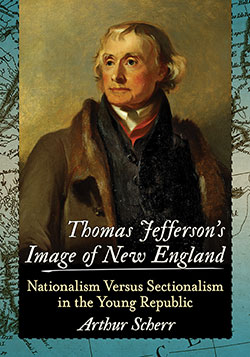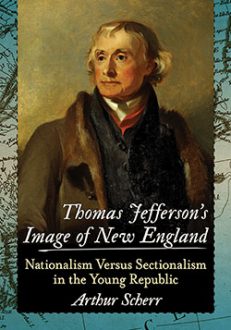Thomas Jefferson’s Image of New England
Nationalism Versus Sectionalism in the Young Republic
$49.95
In stock
About the Book
Writers often depict Thomas Jefferson as a narrow-minded defender of states’ rights and Virginia’s interests, despite his authorship of the Declaration of Independence and vigorous defense of the young republic’s sovereignty. Some historians claim he was particularly hostile to the New England states, whose Federalist electorate he regarded as enemies of his Democratic-Republican Party.
This study of Jefferson’s lifelong relationship with New England reveals him to be a consistent nationalist and friend of the region, from his first visit to Boston in 1784 to his recruiting of Massachusetts scholars to teach at the University of Virginia. His nationalist point of view is most evident where some historians claim to see it least: in his opinions of the people and politics of New England. He admired New Englanders’ Revolutionary patriotism, especially that of his friend John Adams, and considered their direct democracy and town-meeting traditions a model for the rest of the Union.
About the Author(s)
Bibliographic Details
Arthur Scherr
Format: softcover (7 x 10)
Pages: 392
Bibliographic Info: notes, bibliography, index
Copyright Date: 2016
pISBN: 978-0-7864-7537-7
eISBN: 978-1-4766-2621-5
Imprint: McFarland
Table of Contents
Table of Contents
Preface 1
Introduction 3
1. Jefferson’s Early Opinions of New England 9
2. Jefferson, New England and the Shadow of Slavery in the 1790s 23
3. Jefferson and New England: The Crisis of the Late 1790s 32
4. President Jefferson, New England Politics and Patronage: First Years 43
5. Religion, Irreligion and Politics: Jefferson the President Views New England and the Danbury Baptist Association, 1801–1802 48
6. The “Mammoth Cheese” and Jefferson’s Loose Alliance with Massachusetts Baptists 60
7. Jefferson the Politician Courts the New England Federalists 70
8. Jefferson, Freedom of the Press and Federalist “Sedition” in Connecticut 84
9. Jefferson and the Opéra Bouffe Prosecution of “Savage” Connecticut Federalists, 1806–1809 99
10. Jefferson and James Sullivan, Shooting Star of Massachusetts’ Political Firmament 124
11. President Jefferson and New England: From Embargo to War 133
12. The “Sage of Monticello” Views New England at War 152
13. Jefferson and John Melish: A Scottish Pro–American and New England in the War of 1812 164
14. Jefferson Defends New England’s Interests Despite the Hartford Convention 171
15. New England and the South in the Mind of an Aging Jefferson 181
16. Jefferson, Federalist Number 10 and New England Dissent During the War of 1812 191
17. Jefferson and Adams: “Natural Aristocracy,” Class Conflict and the Uses of New England 202
18. Jefferson’s Late-Life Ambivalence Toward New England 213
19. Jefferson Bares His Teeth Against Lyman Beecher and New England’s “Priests” 228
20. Jefferson’s Old-Age Affinity for New England’s Unitarian Theology 245
21. Jefferson, the Missouri Compromise Crisis and the University of Virginia 249
22. Jefferson, the Missouri Compromise and the Haitian Paradox: Virginians and New Englanders 269
23. Reconciling New England and the South to the Revolutionary Heritage, Old and New: George Ticknor, Daniel Webster and Andrew Jackson’s Reputation 278
24. Jefferson’s Political Map and Terminal National Union Include New England 297
Conclusion: New England Wins Jefferson’s Heart 309
Chapter Notes 319
Bibliography 364
Index 377
Book Reviews & Awards
“Scherr exhaustively documents Jefferson’s dealings with New Englanders and how he perceived their region as part of the Union…recommended”—Choice.





